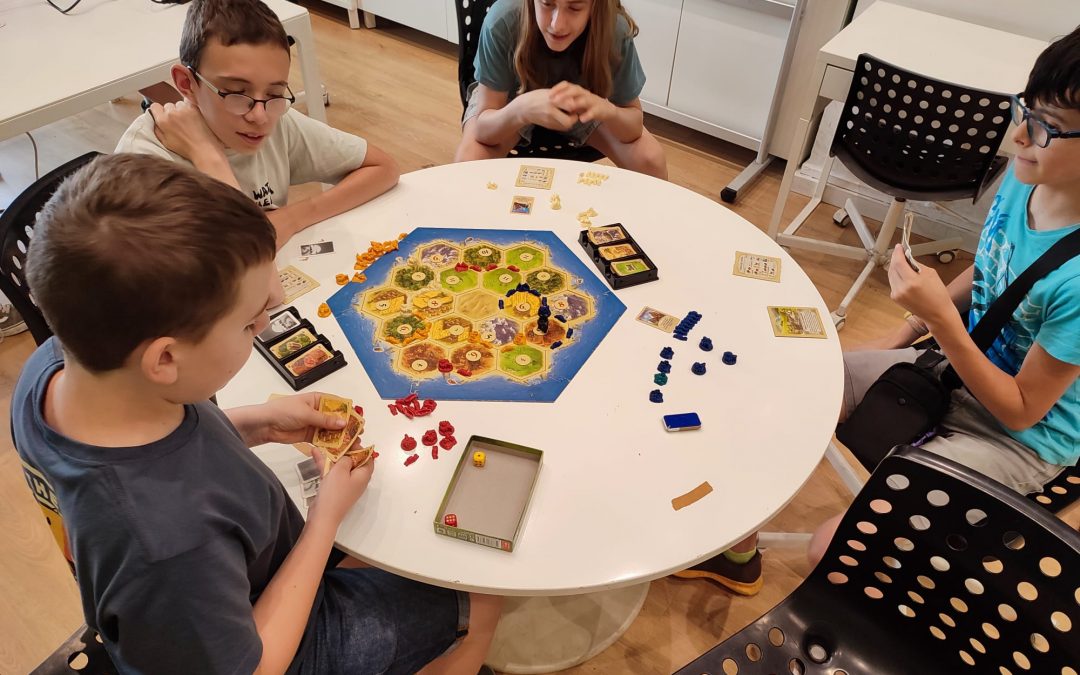Summer is the ideal time to share special moments with your family and friend, and a fantastic way to do this is by playing board games. Board games are also great exercises for the mind, as they encourage key skills such as logical reasoning, creativity, and teamwork. With summer here, this week we recommend 10 board games that will help you spend quality time together during vacation and provide many benefits.
1. Codenames
A classic game of communication and lateral thinking, Codenames is a spy-themed game where two teams compete to find the code words their teammates have to guess. This game boosts deductive reasoning, synthesis, and linguistic creativity, as you must give clever, connected clues. It also develops attention and teamwork, which are essential skills in any field, including programming.
2. Sushi Go!
With its fast-paced card selection, Sushi Go! makes players plan every move and anticipate their opponents’ decisions to optimize points. This game develops tactical decision-making and resource management, while encouraging memory and attention to detail. It’s perfect for learning to think about short-term consequences and strategy, key skills for computational thinking.
3. SET
SET is an exciting challenge for visual perception and pattern recognition. Players search for sets of three cards where their features (shape, color, number, and shading) are either all the same or all different. This game enhances concentration, mental agility, and cognitive flexibility, developing skills like classification and logic, which are fundamental for programming and structured thinking.
4. Exploding Kittens
Exploding Kittens is a highly interactive, lighthearted card game where players draw cards until someone pulls an Exploding Kitten and is eliminated. However, you can use special cards to avoid disaster and throw off your opponents. The game encourages creativity, problem-solving, and adaptability, and its playful nature makes it easy to engage with family members of all ages.
5. That’s Not a Hat
This quick memory game tests your attention to detail and speed processing information. Players must identify different objects in the midst of a chaotic conversation, promoting selective concentration and the ability to adapt to changing situations. It also helps train your working memory and mental agility—skills that are highly valued in programming and problem-solving.
6. Phase 10
Phase 10 is a card game where luck and strategy combine to turn every round into a chance to plan and organize long-term goals. Players have to complete specific phases using combinations of cards, helping develop analytical skills, organization, and process control. This game encourages patience, risk management, and decision-making in a changing environment.
7. Carcassonne
Carcassonne is a tile-placement and territory-building game that supports spatial reasoning and strategic planning. Players place their meeples to control roads, cities, and fields, making smart decisions that affect their final score. This fosters anticipation, problem-solving, and the management of short- and long-term goals.
8. Ligretto
Ligretto is a fast-paced game of speed and observation in which players race to play cards in numerical order as quickly as possible. This fast tempo builds mental agility, concentration, and hand-eye coordination. Players learn to react under pressure and maintain emotional control—essential for managing complex situations and thinking quickly.
9. Qwirkle
Qwirkle is a tabletop game where players create rows and columns of tiles combining different shapes and colors, promoting pattern recognition and strategic planning. The game develops logic, anticipation, and problem-solving, as players have to maximize their points according to the tiles available. It also improves visual perception and critical thinking, essential skills in programming and computational thinking.
10. Dobble (Spot It!)
Dobble, known as Spot It! in the US, is a classic game that trains mental speed and visual agility. Players must find matching symbols between cards as fast as possible, exercising concentration, quick processing, and selective attention. This game is perfect for practicing quick reactions to visual stimuli under time pressure—very useful in any field that requires mental agility.
Benefits of board games
Board games are much more than just a fun way to pass the time; they are powerful tools for developing computational thinking and other cognitive skills:
- They improve problem-solving: many games present challenges that require analysis and creativity.
- They foster collaboration and communication: playing as a family helps grow empathy and teamwork abilities.
- They boost concentration and memory: games like That’s Not a Hat or Dobble/Spot It! are perfect to train attention.
- They develop logical reasoning and planning: strategies, anticipation, and structured thinking are key in games like Carcassonne, Qwirkle, or Phase 10.
- They enhance creativity and imagination: some board games inspire original thinking and creative expression.
Take advantage of the summer to enjoy these games with your family or friends, and turn every game night into a fun workout for your brain. Remember, we also have our Strategy Summer event underway, and this summer you’ll find different games available on our online platform that you can enjoy solo or with your Codelearn classmates.

